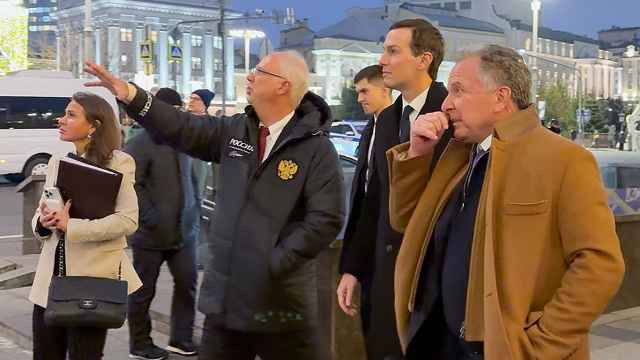ABOARD RUSSIAN RAILWAYS TRAIN 109 — From the comfy cabins of first class to the crowded and smelly third-class bunks, passengers traveling to Moscow from a remote Arctic boomtown demonstrate why Vladimir Putin’s almost certain return to the presidency Sunday feels less than triumphant.
The broad discontent seen on the long-distance train journey reflects that of this sprawling country. Although anger with Putin isn’t unanimous, it is clearly widespread, a striking challenge to his self-promoted image as the working man’s hero who is the only leader all Russians can love and admire.
The frustrations encountered on Train 109 suggest his new term won’t be easy.
The train’s 66-hour, 3,500-kilometer trip to the capital starts in Novy Urengoi, a gas-producing town just below the Arctic Circle. Natural gas revenues are a key piece of the prosperity that Russia has enjoyed under Putin.
The newfound wealth initially pleased Russia’s working classes and lulled them into docile complacency, but many are increasingly discontent with the political ossification that set in under Putin and his placeholder, Dmitry Medvedev.
“For eight years we had Putin, then we had Medvedev, and now Putin again. Who after that? Medvedev?” Alexander Yurov asked in a third-class car. “Well, this is what they’re getting from me,” he says, holding up his middle finger.
An astonishing wave of protests against fraud-marred parliamentary elections in December sprang mainly from cities like Moscow and St. Petersburg, and Putin has been quick to characterize his opponents as coddled urban elites.
But conversations reveal the undercurrent of dissatisfaction across all layers of society and across Russia’s varied geography. In fact, many say the elites are Putin and his cronies.
“All that matters for the government is what’s going on in Moscow and in St. Petersburg. As for the rest of the country, it can just deal with its own problems,” Ilya Kuropatkin said in the corridor of a second-class carriage on his trip to Moscow from the Siberian city of Tomsk.
Much of Putin’s appeal has been based on the stability he brought after the Soviet Union’s collapse and Boris Yeltsin’s capricious and tragicomic rule of the newly independent country. Statistics do present an impressive picture of improvements under Putin.
When he was inaugurated for his first term in May 2000, the average monthly wage was $75; it’s 10 times higher now. The infamously low life expectancy for males rose from 60 to 64. Although Russia’s murder rate is still high by European standards, it has fallen nearly 45 percent in the past dozen years.
“Everybody wants stability,” said businessman Andrei Khorashavin, traveling in first class. “I see Putin as the person that can guarantee that.”
But many of his neighbors even in first class, those who have grown rich in Putin’s Russia, are fed up with the unbridled corruption that infiltrates their everyday lives.
Igor, a software entrepreneur, points to his smartphone and grumbles: “I often buy these as presents.” He means, of course, as bribes to government officials.
Igor, who asked that his last name not be used for fear of damaging his business, says failure to curry favor with officials could leave him prone to arbitrary checks and ruin his chances in state tenders.
Putin’s unchallenged rule has hinged greatly on a deep-rooted conformism among Russians, who widely concluded that an excess of democracy in the 1990s led to chaos and a deterioration in their standard of living.
A small minority of Internet-savvy dissenters bucked this trend, rejecting the official narrative that political pluralism and a free media must be sacrificed for the sake of stability and prosperity.
Criticism of Putin has been all but banished from the national airwaves, allowing the Kremlin to dismiss dissent as irrelevant sniping by marginal figures.
That is proving harder this time, as ordinary people from all walks of life voice disapproval and cities heave with protesters who had never before bothered with political activism.
In his four-berth second-class cabin, Novosibirsk resident Fyodor Kolesnikov said Putin’s economic management is a recipe for disaster.
“The economy has gotten better, but that is only thanks to the oil,” he said. “We need somebody in this country who can make bold decisions. Otherwise, we are just going down the road of stagnation.”
Medicinal supplies trader Yury Pulin, traveling in second class, said it’s fear that has stopped people criticizing Putin.
Critics of Putin’s regime have latched on to such lack of freedom of expression, as well as other abuses.
Despite the criticism, passengers agree with a degree of resignation that their next president will be Putin. For many, the sense of resignation goes even deeper.
“The mosquitoes have had their fill,” Pulin said. “But why invite new ones just so they can take their turn at sucking our blood, too?”
A Message from The Moscow Times:
Dear readers,
We are facing unprecedented challenges. Russia's Prosecutor General's Office has designated The Moscow Times as an "undesirable" organization, criminalizing our work and putting our staff at risk of prosecution. This follows our earlier unjust labeling as a "foreign agent."
These actions are direct attempts to silence independent journalism in Russia. The authorities claim our work "discredits the decisions of the Russian leadership." We see things differently: we strive to provide accurate, unbiased reporting on Russia.
We, the journalists of The Moscow Times, refuse to be silenced. But to continue our work, we need your help.
Your support, no matter how small, makes a world of difference. If you can, please support us monthly starting from just $2. It's quick to set up, and every contribution makes a significant impact.
By supporting The Moscow Times, you're defending open, independent journalism in the face of repression. Thank you for standing with us.
Remind me later.





